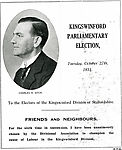 Election address (front)
Election address (front)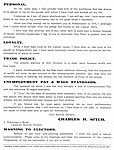 Election address (back)
Election address (back) Protest against cuts in unemployment benefit
Protest against cuts in unemployment benefit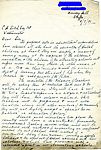 Protest against cuts in teachers' pay (a)
Protest against cuts in teachers' pay (a)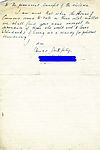 Protest against cuts in teachers' pay (b)
Protest against cuts in teachers' pay (b)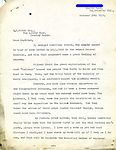 Support for Charles following defeat (a)
Support for Charles following defeat (a)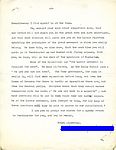 Support for Charles following defeat (b)
Support for Charles following defeat (b)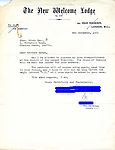 More support
More support

Charles' defeat came after thirteen years as Labour M.P. for Kingswinford. He lost his seat to Mr. A. Todd, Conservative, amidst the "Economic Blizzard" that swept away Labour's second administration in 1931. Charles Sitch's election address and correspondence, which are reproduced here, are perhaps best understood set against the political background of the period.
A minority Labour Government had been elected in May 1929. It presided over a worsening economic and financial position after the Wall Street Crash in October 1929. The Depression was worldwide. Over the next two years the value of British exports fell by half. Unemployment rose from 1.1 million in November 1929 to 2.5 million in December 1931. Tax revenue fell, and the cost of unemployment rose, from £12 million in 1928 to £125 million in 1931. Banks in Europe collapsed in May 1931 causing further loss of British investment. The Government faced an urgent need to balance the budget.
In June 1931 a Royal Commission on unemployment insurance recommended up to 30% cut in benefits. By July the May Committee was recommending a 20% cut. By August 1931 foreign loans were necessary, but the lenders wanted a promise of retrenchment, cuts in public service pay, as well as cuts in benefits.
Chancellor Snowden demanded 10% cut in benefits and public service pay in order to balance the budget and secure loans from New York and Paris. Keynes provided a radical alternative. Suspend the Gold Standard to make British Exports more competitive, encourage industry, and ease the balance of payments. At the same time invest in public works to stimulate the economy. This was rejected.
The proposed cuts split the Labour Government over their basic tenet of a right to "work or maintenance". Prime Minister MacDonald, however, supported his Chancellor. The Cabinet split 11 to 9. On 23rd August Ramsay MacDonald offered the Government's resignation. At the request of King George V, and with the agreement of both the Conservative and Liberal parties, MacDonald stayed on, with a few Labour supporters to head a National Government. This National Government, dominated by the Conservatives, fought a general election as a single entity. In securing 554 seats, it achieved the largest ever electoral majority.
Opinion about MacDonald was divided: "The Prime Minister and the colleagues of his own party who have followed him deserve in particular unqualified credit, both for the manner in which they took their political lives in their hands by facing and forcing the break-up of the late Cabinet, and for their new decision to translate courage in the Cabinet into courage in the country." (The Times, 25th August 1931).
On the other hand: "In Labour circles all over the country Mr MacDonald is being denounced.... for betraying his party... " (New Statesman, 29th August 1931).
When Charles confirmed his loyalty to the Labour Party in his election address, and stated that 'faith in some men is shaken, because of recent national happenings' it suggests that he took the latter view. The address also makes it clear that he was opposed to cuts in unemployment benefit.
The letters reproduced here include one from the Amalgamated Engineering Union, in which concern is expressed that a cut in unemployment benefit would reduce people to destitution and lead to a reduction in wages.
Another warns of the damaging consequences for education, of a cut in teachers' salaries. The last are just two of many dozens of letters sent to Charles following his defeat, expressing support, and hoping for his speedy return to Westminster. These letters are held at the Black Country Living Museum.
Rollover the captions in the box to see the available images in thumbnail format, click the caption to see the full-size image
| Reference: | 646 |
| Keywords: | |
| Archive Ref: | 2007/001/0001 |
| Updated: | Mon 12 Mar 2007 - 0 |
| Interpretation written by | Barbara Harris |
| Author's organisation | |
| Organisation's website | |
| Workers Institute | 2007/001/0001, 2007/001/0007, 2007/001/0014,2007/001/0002, 2007/001/0004 |